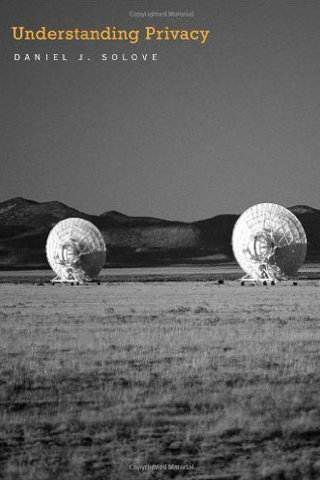Understanding Privacy
Daniel J. Solove
(Harvard University Press 2008)
Privacy is one of the most important concepts of our time, yet it is also one of the most elusive. As rapidly changing technology makes information more and more available, scholars, activists, and policymakers have struggled to define privacy, with many conceding that the task is virtually impossible.
In this concise and lucid book, Daniel J. Solove offers a comprehensive overview of the difficulties involved in discussions of privacy and ultimately provides a provocative resolution. He argues that no single definition can be workable, but rather that there are multiple forms of privacy, related to one another by family resemblances. His theory bridges cultural differences and addresses historical changes in views on privacy. Drawing on a broad array of interdisciplinary sources, Solove sets forth a framework for understanding privacy that provides clear, practical guidance for engaging with relevant issues.
Understanding Privacy will be an essential introduction to long-standing debates and an invaluable resource for crafting laws and policies about surveillance, data mining, identity theft, state involvement in reproductive and marital decisions, and other pressing contemporary matters concerning privacy.
Praise For The Book
Included on the following top book lists:
Professor Lawrence Solum’s “Ten Legal Theory Books from 2008“
Adam Theirer, “The Most Important Tech Policy Books of 2008“
U.S. Navy, Chief Information Officer, “Privacy Recommended Reading List“
“Daniel Solove has had the patience and insight to lay privacy bare. This is the most thorough and persuasive conceptualization of privacy written to date. Solove’s taxonomy of privacy will become the standard tool for analyzing privacy problems.”
— Peter Swire, C. William O’Neil Professor of Law
Ohio State Law School
“Daniel Solove offers a unique, challenging account of how to think better about– and of– privacy. No scholar in America is more committed to demystifying ‘the right to privacy’.”
— Anita Allen, Henry R. Silverman Professor of Law and Professor of Philosophy
University of Pennsylvania Law School
“One of the topic’s most prolific and thoughtful thinkers, Daniel Solove has written a clear and comprehensive analysis of privacy. In it, he explains why it has been so hard to conceptualize this thing called privacy, and provides a pragmatic, bottoms-up understanding. Its systematic analysis and broad-ranging coverage clears the analytical brush. It will promote sharper thinking and analysis for the next generation of privacy scholarship and policy.”
— Jerry Kang, Professor of Law
UCLA Law School
“Instead of reducing this subject to an academic parlor game, Solove uses interdisciplinary sources to offer a convincing argument about why everyone should care deeply about understanding the nature of privacy. Legal scholars will want to read this book, but so will psychologists, communication specialists, public policy makers, philosophers, and anyone interested in where to draw the line between public and private life. . . . Highly recommended.”
— D. S. Dunn, Choice
“[A] thoughtful examination of the concept of privacy: what it is, why it seems forever under threat and why we continue to fight for it.”
— Paul Duguid, The Nation
“Solove’s book exhibits both a solid and critical command of [privacy’s] complexity and philosophical richness, and it succeeds in making the theoretical contribution he sets out for himself. . . . [A] a major contribution to . . . understanding [privacy]. One can only hope that jurists and other policy-makers give it the careful consideration it richly deserves.”
— Philip Dynia, Law & Politics Book Review
“With the publication of Understanding Privacy, Daniel J. Solove has firmly established himself as one of America’s leading intellectuals in the field of information policy and cyberlaw. . . Solove has now elevated himself to that rarefied air of “people worth watching” in the cyberlaw field; an intellectual — like Lawrence Lessig or Jonathan Zittrain — whose every publication becomes something of an event in the field to which all eyes turn upon release. . . Make no doubt about it, Daniel Solove’s book — and his approach to classifying and dealing with privacy problems — will have a profound impact on all future privacy debates. In that sense, it is a vital text; a must read for all who follow, or engage in, privacy debates.”
— Adam Thierer, Technology Liberation Front
“The heart of Understanding Privacy. . . lies in the rich taxonomy it develops to classify a diverse and comprehensive set of privacy problems. The framework both accepts and bridges cultural and societal differences, providing a flexible tool for identifying and understanding issues of privacy in whatever context they emerge. Professor Solove’s book is a concrete intellectual step forward–a practical guide for practitioners, theorists, and inquisitive laymen alike, as they attempt to address the multitude of perplexing, yet important, issues surrounding privacy.”
“Much as Samuel Warren and Louis Brandeis mapped the importance of privacy in the face of the changing technologies of their time, Solove has done the same (and then some) for ours. In a carefully crafted text, he illustrates the deficiencies of existing theories of privacy and then develops an alternative, pragmatic approach to mapping privacy’s everchanging terrain. . . . In the last decade, Solove’s scholarship has shaped how academics, courts, politicians, and the public think about privacy. Understanding Privacyadvances his project by providing a functional and flexible framework for policy makers and judges to apply when assessing current and future privacy problems. The strength of Solove’s pragmatism is its openness to contingencies, cultural change, and unforeseen concerns.”
— Danielle Citron & Leslie Henry, Michigan Law Review
“In Understanding Privacy, Solove devises a practical and unpretentious framework for looking at privacy afresh, and his approach, and the taxonomy it leads to, is one accessible to the general reader and the student as well as to the legal and information specialist. The book includes some 40 pages of notes (good for following up the numerous sources) and an elegant index (there is no formal bibliography). Early chapters set out what has been said before and why we need to move on. A most attractive study for general use and a good source for academic work.”
— Stuart Hannabuss, Library Review
“[C]ompelling . . . [H[as the potential to influence the way that the courts, firms, and marketers think about privacy. Understanding Privacy is thoroughly researched and grounded in legal theory, yet it offers a pragmatic and straightforward approach for describing privacy harms . . . [T]he book is clearly written, well structured, and filled with interesting legal cases.”
George R. Milne, American Marketing Association
“If you work in privacy or data protection either from a technology or policy perspective, you need to read this book and understand Solove’s approach.”
— Adam Shostack, Emergent Chaos
“The virtue of Solove’s short and crisply written volume, which is a pleasure to read, is its taxonomy of four genus and 16 species of interests subsumed under the term privacy. . . . Solove’s elegant summary of the literature treating each of these different interests is illuminating.”
— Aziz Huq, New York Law Journal
“[Solove] has tried to capture the byzantine complexities of modern privacy. . . . Going beyond simple definitions such as the divulging of a secret, Solove has developed a taxonomy of privacy, and the harms that result from their violation. . . . Solove’s goal is to provide a coherent and comprehensive understanding of what is traditionally an elusive and hard-to-explain concept: privacy violations.”
— Bruce Schneier, Wired
“This work is an invaluable scholarly addition to the area of privacy. The author must be specifically appreciated for his skill in explaining even complex concepts in an interesting and precise manner . . . This book is a must-read for policy makers and practitioners working in this area.”
— Aural George Scaria, Oxford Journal of Intellectual Property Law and Practice
“Solove shows a strong sensibility for how privacy protections have profound effects on the culture of trust, political culture, power relations, structural inequalities, state and corporate power, freedom, democracy, and overall quality of life. . . . This is a highly informative and readable book that should be included not only in undergraduate preparatory courses for professional degrees candidates but also in introductory courses to social sciences so that students can continuously be reminded why privacy is worth protecting.”
— Vida Bajc, Surveillance & Society
“Understanding Privacy is not just a book for academic scholars. This book should be read by any person who has ever experienced an invasion of privacy. It provides a deep understanding of the importance of privacy and the erosion of privacy that is currently taking place.”
— Sheena Foye, Journal of High Technology Law


